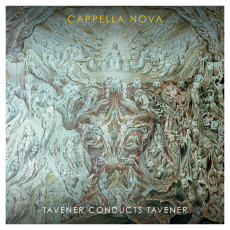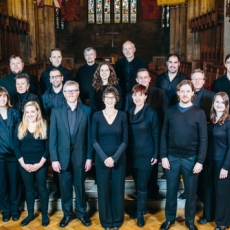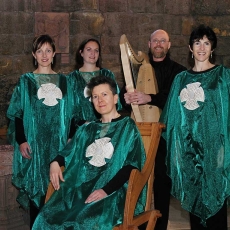Cappella Nova - Tavener Conducts Tavener - WQXR
On "Tavener Conducts Tavener," Sir John Tavener's "The Lamb" begins with vocalists singing something originally asked in pen by William Blake: "Little Lamb, who made thee?" It's a good question, because the lamb doesn't seem to know. As more and more parts join the choir, adding depth and dissonance, the question expands, only to be answered by the full choir itself - God made the lamb, who, at this point, is more Jesus than young sheep.
If we cast Tavener's music as the Lamb, "Who made thee?" seems like it has more concrete answers: Tavener himself, the late, legendary English composer; vocal ensemble Cappella Nova and conductor Alan Tavener (yes, relation: cousin); engineers and album executives. But it's not a satisfying answer, because Tavener's music initially feels larger and more resonant than what you'd expect from a collection of mouths. But, after a while, the music convinces you - there's no better instrument for transcendence than the human voice.
"Tavener Conducts Tavener" tours the listener through the composer's vast repertoire, some works being recorded for the first time. Many are short, but none lack punch, like the triumphant "A New Commandment" or "O That We Were There!," which spirals into a tangle of woven wails before congealing again. "O isplendor" is the only non-Tavener piece, a stunning memorial work by his friend Ivan Moody that quotes airy Byzantine chant. The opening and closing sections of "Resurrection" bookend the album, oscillating between near-silence and sublime vocal collages.
How can something so purely human sound so holy, so supernatural? Herein lies the paradox of much choral music, especially that of sprawling, meditative composers like Tavener and Pärt. This intersection happens visually in the just-revamped world of Star Wars (bear with me): colossal spaceships, planet-sized structures, and physics-defying technology that all appear post-human are always coated with a layer of human error (or charm): dust, clunkiness, manual controls.
Tavener isn't dusty, and his music certainly isn't science fiction, but he and George Lucas succeed at the same game. Neither humanity nor what elevates it, of course, can be entirely innocent. Even "The Lamb," which Blake paired with his evil-themed poem "The Tyger," gets a melancholy setting, and the same emotional complexity is present in all of Tavener's works: The presence of good and evil. Major and minor. The light side, and the dark.


